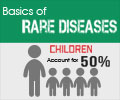Highlights
- The Rights of People with Disability Bill 2016 is a landmark bill passed by both the Lok Sabha and the Rajya Sabha in the Parliament in December 2016.
- The bill is especially significant for 70 million (7% of India’s total population) who live with some kind of genetic/rare disease.
- The inclusion of a range of common rare disorders in the bill is a positive step towards recognizing the rights of people with rare diseases.
The RPD Bill 2016 clearly lays out principles for the protection and empowerment of people with disabilities which mainly include:
- Autonomy and freedom of choice
- Non-discrimination
- Full participation and effective inclusion in society
- Non-discrimination between genders
- Equality of opportunity
- Accessibility
The Bill provides for inclusion of high support needs for those who require extra facilities and services. All government offices and public buildings must be accessible to people with disabilities.
The Bill provides for reasonable accommodation to provide necessary adjustments in the environment to allow for access and equity. Special provisions for inclusive education and employment are also provided.
The highlight of this Bill is the affirmative action of reservation in education and employment which has been increased from 3% to 4% to accommodate the needs of all 21 disabilities. This Bill also provides for free legal aid for people with disabilities to address issues faced by the community.
Coming to the 21 disabilities listed in the Bill, the following genetic/rare/chronic diseases have been covered:
- Muscular dystrophy
- Neurodegenerative disorders like multiple sclerosis and Parkinson’s disease
- Blood disorders like Hemophilia, Thalassemia and sickle cell anemia
People with genetic/rare diseases require a good deal of reasonable accommodation in education and employment. This could be easing out the attendance rules to accommodate absence due to hospitalization for treatment and other complications. Employment rules need to include work-from-home options to ease out the strain of physical commute and workplace strains. What is also important to note is the access to reservation in education and employment for those with these genetic/rare conditions. Lack of understanding, information and knowledge of these diseases often lead to apathy and discrimination in education and employment spaces. The passage of this Bill provides a legal tool to fight such discriminations for people with rare/genetic disorders.
However, it must be noted that not all genetic/rare disorders require such expensive drugs and treatment and people with Thalassemia and Hemophilia have been receiving state funds in Karnataka and other states respectively. Facilities for such disorders include free blood and components, free blood transfusion, free drugs and free factor injections at state-run facilities. Two notable centers in Bangalore include the ones at Victoria Hospital attached to the Bangalore Medical College and Research Institute and Indira Gandhi Institute of Child Health. Thalassemia and Hemophilia patients avail free day care facilities and treatment at these two centers.
The existing government health insurance schemes like Universal Health Insurance Schemes (UHIS) and Rashtriya Swasthiya Bima Yojana (RSBY) are only targeted at those below the poverty line (BPL). Such schemes now need to be more inclusive and include disabilities so that disabling illnesses do not become a key driver of poverty for patients and families. What the Bill should have also clarified is the role of private health insurers in providing health insurance to people with disabilities. This lack of clarity implies that people with disabilities will have to depend on government schemes for healthcare access.
While the RPD Bill 2016 has effectively paved the way for introducing the discourse on genetic and rare disorders, it should also pave the way for a national policy on genetic and rare disorders. The RPD Bill 2016 is definitely a clear cut tool for social and legal protection of the listed genetic/rare disorders. To support the RPD Bill 2016, we also need a national rare disease policy to guarantee health rights, access, equity and justice. This policy would also include the most common existing rare diseases in India regardless of numbers. Such a policy which includes an orphan drug act, private health insurance guarantee and government schemes to procure drugs and devices for genetic/rare disease treatment would go a long way in supporting the inclusion of people with genetic/rare disorders in the healthcare space.
References
- RIGHTS OF PERSONS WITH DISABILITIES BILL 2016 - (http://www.parliament.gov.fj/getattachment/Parliament-Business/Bills/2016-Bills/Bill-No-12-Rights-of-Persons-with-Disabilities.pdf.aspx)
- The Rights of Persons with Disabilities Bill, 2014 - (http://www.prsindia.org/billtrack/the-right-of-persons-with-disabilities-bill-2014-3122)
- Rare Disease Information - (https://rarediseases.org/for-patients-and-families/information-resources/rare-disease-information/)








